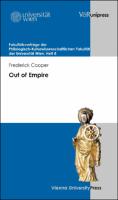Out of Empire
Redefining Africa’s Place in the World (Volume 8)
| dc.contributor.author | Cooper, Frederick | |
| dc.contributor.editor | Römer, Franz | |
| dc.contributor.editor | Weigelin-Schwiedrzik, Susanne | |
| dc.date.accessioned | 2022-05-20T05:30:49Z | |
| dc.date.available | 2022-05-20T05:30:49Z | |
| dc.date.issued | 2013 | |
| dc.identifier.uri | https://library.oapen.org/handle/20.500.12657/54623 | |
| dc.description.abstract | The history of decolonization is usually written backward, as if the end-point (a world of juridically equivalent nation-states) was known from the start. But the routes out of colonial empire appear more varied. Some Africans sought equal rights within empire, others to federate among themselves; some sought independence. In London or Paris, officials realized they had to reform colonial empires, but not necessarily give them up. The idea of “development” became a way to assert that empires could be made both more productive and more legitimate. Frederick Cooper explores how these alternative possibilities narrowed between 1945 and approximately 1960. | |
| dc.language | English | |
| dc.subject.other | Political Science | |
| dc.subject.other | Colonialism & Post-colonialism | |
| dc.title | Out of Empire | |
| dc.title.alternative | Redefining Africa’s Place in the World (Volume 8) | |
| dc.type | book | |
| oapen.identifier.doi | 10.14220/9783737300970 | |
| oapen.relation.isPublishedBy | af16fd4b-42a1-46ed-82e8-c5e880252026 | * |
| oapen.relation.isFundedBy | b818ba9d-2dd9-4fd7-a364-7f305aef7ee9 | |
| oapen.relation.isbn | 9783737000970 | |
| oapen.collection | Knowledge Unlatched (KU) | |
| oapen.imprint | V&R unipress | |
| oapen.identifier | https://openresearchlibrary.org/viewer/aca98a8d-e0e6-4b0f-95da-43b77f2f004e | |
| grantor.number | 6408 |

